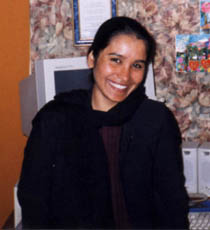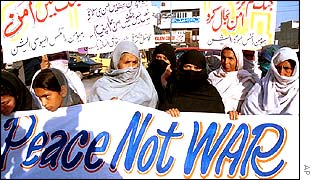
|
Klaus Bung: The three friends |
Klaus Bung: The three friends
Length: 893 words = 4172 characters
Email: klaus.bung@tudo.co.uk
Editorial introduction
In this true story, set in the North East of England, three youngsters from the Indian subcontinent work together on a computing project. They are: Uzman (Muslim from Pakistan), Aisha (Muslim girl from India) and Ashok (Hindu from India). How do they respond to the rising hostility between India and Pakistan?
Klaus Bung:
The three friends
This is a true story. In the computing department of a Technical College in the North East of England, Uzman, a Muslim student of education, approaches Aisha, Muslim, the star student of the computing class, one of two girls among thirty boys.
'I need someone to design a website for me. I need it for some learning research I am doing for my degree. I can pay you some money, but very little, for I am not earning anything. But it will be good practice for you. Will you do it?'
'This is the first time for me to take on such an assignment. I'd like to give it a try. I will talk to my friend Ashok. He has more experience. If he joins in, I'll do it.'
Ashok, a Hindu, only slightly older than the other two agrees to help. He does not expect any money, so Uzman need not worry.
'Tell him, we will accept whatever he pays, no matter how much work we put in. He can relax,' says Ashok.
They meet to discuss the details of the project. Uzman is surprisingly vague about various innocuous but relevant things, and Ashok almost has to draw the information out of him with a corkscrew. At last, the purpose and context of the project is clear. Aisha and Ashok understand what they are expected to do.
During the tea break, the conversation turns to some personal things. Aisha was born in a village in Uttar Pradesh, India. And Uzman?
Uzman blushes, he stammers: 'I'm from Pakistan. Pakistan and India are enemies. Now, I suppose, you won't want to do the site for me, will you?'
Ashok and Aisha exchange glances. Aisha is a modern girl, sometimes Ashok calls her 'Devi', she is capable of taking the lead.
|
Aisha, a good friend |
'India and Pakistan shouldn't be enemies, the three of us aren't,' Aisha says. 'We are human beings, we are friends, that is more important than our religions, our countries and our communities. We will do your website no matter what, and we shall remain friends and help each other, whatever some irascible old people and some fanatical young people do in other countries.'
'How sad,' thinks Ashok, 'that poor harmless Uzman should even have thought of losing our help, should even have been afraid of admitting that he was from Pakistan! And they are both Muslims! Even more confusion of loyalties.'
Uzman is deeply grateful. If, God willing, Aisha and Ashok ever come to Pakistan, they must visit his village. They will be honoured guests in the house of his family.
Ashok and Aisha spend the Christmas vacation of 2001 working on Uzman's website. News from India and Pakistan become increasingly worrying: terrorist attack on the Indian parliament, Indian villagers evacuated from the partition line through Kashmir, talk of the nuclear danger and that America can and must stop either side from making a nuclear strike.
Ashok feels sorry for Uzman, whose degree depends on this website and who, faced with such serious news, does not know what Aisha and Ashok are thinking while in fact they are quietly working away on his project. Ashok discusses the matter with Aisha and they draft a reassuring e-mail for Uzman:
'27 December 2001
Hi Uzman,
Just a quick Hello from Aisha & me. We r working on ur website & r making gd progress. Inshah Allah, we will b able 2 show u a first draft at the beginning of term. Aisha will let u know when we have got that far.
Meanwhile keep cheerful & don't let international politics get u down. We r friends no matter what other people, esp. generals & politicians, do. We r human beings no matter where we r from. But may Allah protect all our countries & people from foolishness!
There is a nice old Hindu prayer: "Protect us, Lord, from desire, fear and anger."
These r the greatest sins cos they do most harm 2 the person who comits them. Apply that 2 our countries:
- desire: both want (or want to keep) the same piece of land
- fear: each is afraid of the other, presumably without good reason
- anger: each might in a flash of anger do something that it will afterwards regret
Take care, and Happy New Year, from Aisha and Ashok.
When the parents of the three heard about these sentiments, they were deeply disappointed.
'These youngsters have no more ideals,' said Uzman's father.
'They have lost touch with their mother country,' said Aisha's father. 'Their children will no longer know that they are Indian, they will have forgotten to speak Urdu and they will neglect their religion.'
'They know nothing of Kashmiri history and the Hindu spiritual heritage of that region. They have abandoned the values that we fought for and that our ancestors died for,' said Ashok's father.
The mothers said nothing.
|
© BBC News Peace Protest in Rawalpindi, Pakistan |
Eventually the American President found the words which were adequate to the tragic situation, when he said, literally: 'We are working hard to convince both the Indians and the Pakis that there's a way to deal with their problems without going to war' (Guardian, London, 9 Jan 2002). That's what the Afghans felt when the bombing started.
A sad tale indeed. But since it happened, it had to be told.
Email: klaus.bung@tudo.co.uk
===(end of story)===
Notes for translators
These notes are not meant for publication. They are intended to help translators, especially those coming from very different cultures. However, if a magazine editor wants to publish any of them in conjunction with the story or use them to write an introduction, she is welcome to do so.
1 In their email message, the youngsters use ideosyncratic spelling which owes its popularity to text messages on mobile phones, where typing is difficult and the number of characters per message is severely restricted (e.g. to 160 characters). The abbreviations are often based on phonetic similaries, e.g. 'c' sounds like 'see', '8' sounds like 'ate' and 'eight', etc. In imitating this style of writing the translator has to abbreviate different words, namely those which are commonly abbreviated in this way by youngsters in her country sending text messages.
Abbreviations used:
|
& = and r = are ur = your gd = good b = be 2 = to u = you cos = because esp. = especially |
Other examples: l8 = late (because 8 = eight, sounds like 'ate' l8r = later c u l8r = see you later (because 'c' sounds like 'see') etc |
2 Insha Allah = God willing, so Gott will, oxalá, etc
3 the Pakis: President Bush actually said the sentence quoted in the story and referred to 'Pakistanis' as 'Pakis'. The word 'Pakis' is considered very offensive in England (something on the level of 'niggers') and slightly less offensive in America. There was a public outcry after President Bush had made this gaffe.
(eof)

